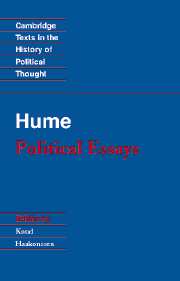Book contents
- Frontmatter
- Contents
- Acknowledgements
- Introduction
- Chronology
- Bibliographical notes
- A note on the text and the edition
- Biographical notes
- Bibliography
- Political Essays
- 1 Of the liberty of the press
- 2 That politics may be reduced to a science
- 3 Of the first principles of government
- 4 Of the origin of government
- 5 Of the independency of Parliament
- 6 Whether the British government inclines more to absolute monarchy, or to a republic
- 7 Of parties in general
- 8 Of the parties of Great Britain
- 9 Of superstition and enthusiasm
- 10 Of civil liberty
- 11 Of the rise and progress of the arts and sciences
- 12 Of national characters
- 13 Of commerce
- 14 Of refinement in the arts
- 15 Of money
- 16 Of interest
- 17 Of the balance of trade
- 18 Of the jealousy of trade
- 19 Of the balance of power
- 20 Of taxes
- 21 Of public credit
- 22 Of some remarkable customs
- 23 Of the original contract
- 24 Of passive obedience
- 25 Of the coalition of parties
- 26 Of the Protestant succession
- 27 Idea of a perfect commonwealth
- Appendix: Excerpts from Hume's History of England
- Notes
- Index
- Title in the Series
6 - Whether the British government inclines more to absolute monarchy, or to a republic
Published online by Cambridge University Press: 05 June 2012
- Frontmatter
- Contents
- Acknowledgements
- Introduction
- Chronology
- Bibliographical notes
- A note on the text and the edition
- Biographical notes
- Bibliography
- Political Essays
- 1 Of the liberty of the press
- 2 That politics may be reduced to a science
- 3 Of the first principles of government
- 4 Of the origin of government
- 5 Of the independency of Parliament
- 6 Whether the British government inclines more to absolute monarchy, or to a republic
- 7 Of parties in general
- 8 Of the parties of Great Britain
- 9 Of superstition and enthusiasm
- 10 Of civil liberty
- 11 Of the rise and progress of the arts and sciences
- 12 Of national characters
- 13 Of commerce
- 14 Of refinement in the arts
- 15 Of money
- 16 Of interest
- 17 Of the balance of trade
- 18 Of the jealousy of trade
- 19 Of the balance of power
- 20 Of taxes
- 21 Of public credit
- 22 Of some remarkable customs
- 23 Of the original contract
- 24 Of passive obedience
- 25 Of the coalition of parties
- 26 Of the Protestant succession
- 27 Idea of a perfect commonwealth
- Appendix: Excerpts from Hume's History of England
- Notes
- Index
- Title in the Series
Summary
It affords a violent prejudice against almost every science, that no prudent man, however sure of his principles, dares prophesy concerning any event, or foretel the remote consequences of things. A physician will not venture to pronounce concerning the condition of his patient a fortnight or month after: And still less dares a politician foretel the situation of public affairs a few years hence. Harrington thought himself so certain of his general principle, that the balance of power depends on that of property, that he ventured to pronounce it impossible ever to re-establish monarchy in England: But his book was scarcely published when the king was restored; and we see, that monarchy has ever since subsisted upon the same footing as before. Notwithstanding this unlucky example, I will venture to examine an important question, viz. Whether the Britishgovernment inclines more to absolute monarchy, or to a republic; and in which of these two species of government it will most probably terminate? As there seems not to be any great danger of a sudden revolution either way, I shall at least escape the shame attending my temerity, if I should be found to have been mistaken.
Those who assert, that the balance of our government inclines towards absolute monarchy, may support their opinion by the following reasons. That property has a great influence on power cannot possibly be denied; but yet the general maxim, that the balance of one depends on the balance of the other, must be received with several limitations.
- Type
- Chapter
- Information
- Hume: Political Essays , pp. 28 - 32Publisher: Cambridge University PressPrint publication year: 1994
- 1
- Cited by



